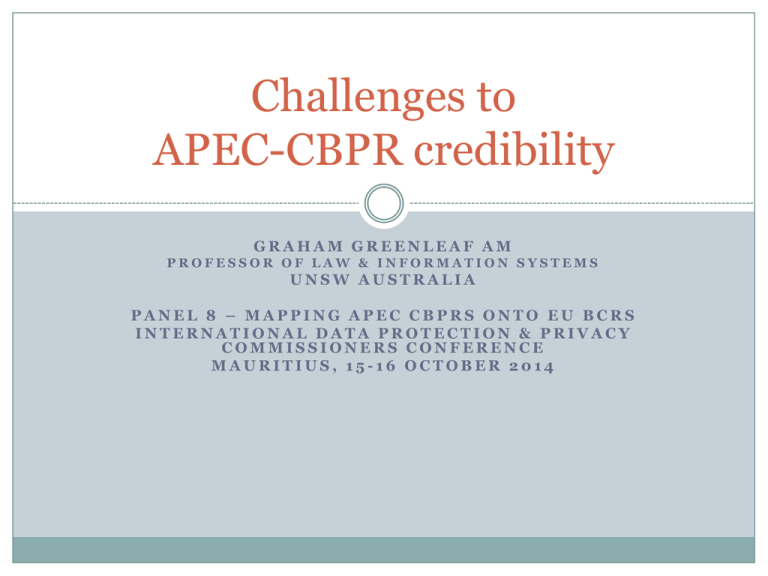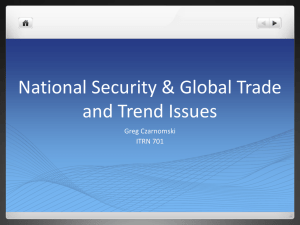IDPPCC_APEC
advertisement

Challenges to APEC-CBPR credibility GRAHAM GREENLEAF AM PROFESSOR OF LAW & INFORMATION SYSTEMS UNSW AUSTRALIA PANEL 8 – MAPPING APEC CBPRS ONTO EU BCRS INTERNATIONAL DATA PROTECTION & PRIVACY COMMISSIONERS CONFERENCE MAURITIUS, 15-16 OCTOBER 2014 What has APEC-CBPR shown in 2 years? Questions: What is the value proposition for companies to become certified? What is the value proposition for consumers? Is CBPR being run as effective regulation? Is APEC requiring that countries meet its standards? Was the only certification of an AA rigorous enough? Will the renewal of that AA be rigorous enough? What further tests of CBPR credibility will arise? APEC-CBPR: What is the value proposition for companies to become certified? Certification does not reduce or satisfy obligation to comply with all local laws – including data export limits Certification has no effect on the same company in other APEC countries: NO ‘APEC-wide’ certification Certification does not mean personal data can be transferred FROM any other APEC country It also has no direct effect on ability to import from outside APEC In countries with higher privacy standards than APEC, certification adds nothing – most APEC countries, but not US Gilbert+Tobin Lawyers (Australia): ‘no compelling reason to participate’ CBPR will not lead to EU ‘interoperability’ EU A29 finds BCRs require more than CBPR in 26/27 elements Some have no common elements eg no 3rd P beneficiary rights APEC-CBPR: Of no value to consumers Companies are only required to meet the 1980’s standard APEC Principles (eg no deletion required) CBPR certification does not cover all personal data a company collects – only data it intends to export! Consumers cannot know if particular data is protected CBPR certification does not even mean that a company complies with local laws CBPR certification does not require compensation payments for breaches – or any other remedies CBPR certification does not apply to processors APEC-CBPR administration: No independent assessment of economy participations CBPR participating countries must have effective laws enforcing to APEC standard ‘laws and regulations … the enforcement of which have the effect of protecting personal information consistent with the APEC Privacy Framework’ Problem: JOP charter only allows consultation with economy concerned, not independent viewpoints No provision for any external submissions before accreditation JOP Findings Reports show no external inputs or research – they are close to self-assessment Eg Failure of Japan to enforce its laws is never questioned APEC-CBPR administration: Ignoring the AA rules USA’s appointed AA did not meet APEC standards Did not meet at least 21 of APEC’s program requirements Only required by JOP to remedy non-application to offline activities; and to separate CBPR reporting from others Problem: no formal procedure for third party input AA’s first year shows continuing failure to comply Did not apply program to offline activities, mobiles etc 2/5 certifications involved conflicts of interest in certifications Renewal of AA appointment tests credibility of JOP Australian Privacy Foundation submission opposes renewal APEC-CBPR administration: Further challenges ahead Will JOP require AA applicants to meet APEC standards? Will JOP ever refuse an AA application/renewal? If applications/renewals cannot fail, is this regulation? Will AAs ever revoke company certifications? Will AAs publish objective selections of case studies? Will any non-US companies get certification? Can CBPR certification be made relevant to consumers? APEC CBPR should prove itself, not be taken on trust The EU & all interested parties need to remain vigilant Documentation Australian Privacy Foundation (APF) ‘Submission [to APEC-CBPR JOP] opposing the 2014 renewal of recognition of TRUSTe as a CBPR Accountability Agent (AA)’ (13 June 2014). G Greenleaf ‘APEC's Cross-Border Privacy Rules System: A House of Cards?' (2014) 128 PLBIR, 27-30 http://ssrn.com/abstract=2468782 G Greenleaf & N Waters ‘APEC's CBPRs: Two years on – take-up and credibility issues’ (2014) 129 PLBIR, 12-15 http://ssrn.com/abstract=2481812 G Greenleaf & F Shimpo ‘The puzzle of Japanese data privacy enforcement’ (2014) 4 (2) International Data Privacy Law 139154http://idpl.oxfordjournals.org/content/4/2/139.abstract











